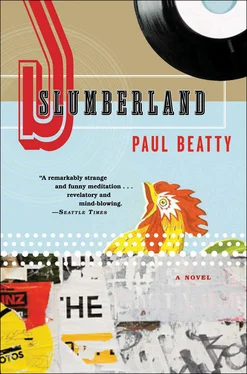Music. My music. Not mine in the sense that backseat lovers have songs or fifties rock ’n’ roll belongs to the devil, but mine in the sense that I own the music. I wrote it. I own the publishing. All rights are reserved. The song is titled “Southbound Traffic Jam.” It opens with a rumbling melody, ten lanes of bumper-to-bumper morning rush-hour traffic over a sampled Kokomo Arnold guitar solo. In the background, two exits away and tail-gating the guitar riff, is the intermezzo, a Peterbilt eighteen-wheeler that merges into the tune with grinding gears and a double blast of its air horn. After sixteen bars of bottleneck guitar and bottlenecked cars (no one ever gets the joke), a Japanese sedan suddenly slams its brakes. The wheels lock. The skid is ominously long and even. I can’t count the number of times I’ve heard this track, and yet that high-pitched screech still makes me brace for impact. Steel myself for the sound of sheet metal folding in stereo. A windshield explodes and ten thousand cubes of safety glass fall to the fast-lane pavement with the digitally crisp tinkle of a Brazilian percussion instrument. Sun Ra’s satur-nine falsetto bespeaks the urgency.
So rise lightly from the earth.
And try your wings. Try them now.
While the darkness is invisible .
The guitar comes up, the traffic chugs on. Kokomo hums and moans. The knees of the receptionist pop. She’s at the door, peeking through the crack. Staring at the bulge in my Speedo, listening to my music, and wondering why. How does it come to this?
You’d think I’d be used to it by now — this lack of sunshine. But winter in Berlin isn’t so much a season as it is an epoch. Eight months of solid prison-blanket-gray skies that, combined with the smoky nightlife and the brogan solemnity of the Berlin footfall, give the city a black-and-white matinee intrigue. If it weren’t so cold I’d think I was doing a cameo in an old Hollywood melodrama. To shake the leaden September-to-April monochrome I find myself colorizing things. Ingrid Bergman’s eyes, the Polish prostitute’s language, the pastry sprinkles on the Schoko-Taler in the Bäckerei window, the patches of sky on a partly cloudy to mostly cloudy afternoon are all a false-memory shade of blue. A blue that doesn’t exist in nature, but resides only in my mind and the twang of Kokomo’s guitar.
On days when the skies are clear and that stark blue I’d long forgotten, I sprint out of the apartment and into the blinding afternoon looking for affection and serotonins. For an instant I forget where I am, then I notice the narrow wheelbases on the cars parked along the street with showroom precision. At the intersection of Schlüterstrasse and Mommenstrasse, dogs, dog owners, and unescorted schoolchildren, all equally well behaved, patiently wait for the walk signal. I look down at my funny-looking shoes and I remember where I am. Berlin, yup, Berlin .
The quirky functionality of the German shoe, like that of Volkswagens and Bauhaus, grows on you. If one is a creationist, the Adam and Eve of German cobblery are the bowling and nursing shoe, respectively. Shoe Darwinists such as myself believe the lungfish of the species is the three-hundred-year-old Birkenstock.
I own a highly evolved pair of Birkenstocks, all-season Hush Puppy — hiking boot hybrids that adapt to the ever-changing environment like suede chameleons. It is in these sturdy marvels of natural selection that I traipse around the city frantically searching for the sun in the same panic-stricken manner in which I look for my keys. The deductive clichés run through my head: When did you last see the sun? Are you sure you had it when you left the house? I work my way backward from the shadows of the Cinzano umbrellas that front the outdoor cafés and head for the Ku’damm shopping district. The crushed quartz in the sidewalk sparkles. Tourists wave from the tops of the double-decker buses. The sun is indeed “out,” but I can never find it in the sky.
None of the Germanic tribes had a sun god. Pagan as philosophy professors, the Visigoths, the Franks, and the Vandals knew better than to believe in something they couldn’t see. Ra, Helios, Huitzilopochtli — my name for the sun is Charlie. I weave in and out of pedestrians imagining that two thousand years ago some Hun idler shod not in Birkenstocks but straw sandals trod the same path looking for solar spoor in these now-concrete wilds. But I catch only glimpses of the yellow deity, the corona shimmering through the leaves of the tree blossoms in Tiergarten Park, the herbalescent shampoo sheen in a tall blonde’s hippie-straight locks, maybe a reflection in a skyscraper’s glacial façade. My sightings are never more than partial eclipses; castle parapet or church steeple, something is always in the way.
Knowing the Egyptians haven’t done anything of note in three thousand years, the Berlin civil engineers must have taken a cue from the ancient ones. Giza’s men of science built Cheops’s pyramids to align with the celestial pole, and so too did Berlin’s urban planners, establishing a zoning code that seemingly stipulates every structure, be it building, billboard, street lamp, or bird’s nest, be erected to such a height or in such manner as to prevent any person of normal stature standing at any point within the city limits from having a clear and unobstructed view of the sun.
I always conveniently abandon the search at Winterfeldtplatz, the bells of Saint Matthias ringing in the dusk and signaling an end to the hunt. The sky darkens. The acrid smell of charred pita bread and shawarma lingers in the air. An old man rides a creaky two-speed. A woman curses her uncooperative daughter. The lights inside the Slumberland bar flicker on. In all the time I’ve lived here I’ve seen one sunset. And if it hadn’t been for the reunification of Germany it wouldn’t be that many.
The buzzer goes off but before I start to climb out the receptionist resets the tanning-bed timer for fifteen more minutes, restarts my song, and beckons me to lie back down. Retaking her seat, she listens to the music, one corner of her mouth raised in a deeply impressed smile. Suddenly that corner lowers into a pensive frown. Her fingers stop dancing. Her feet stop tapping. She wants to know why. Why I tan. Why I came to Germany. I tell her it will take more than fifteen minutes to answer that question. It will take the two of us having one of those good horizontal relationships, the kind that the day-to-day verticality of dating, jogging, and window-shopping eventually destroys after two years. By the time I got to the point where I mailed her postcards with accidental haikus scribbled hastily on their backs. .
In bed we cool. Kiss.
Soon as my feet hit the floor—
The shit go haywire .
…her question would remain unanswered, then I’ll call her whining, “I sent you a postcard, please don’t read it.” She’d want to break up with me, but wouldn’t go through with it because she still hadn’t found out why.
She shifts her plump behind in the chair. The chair squeaks. My sphincter tightens. Other than that I don’t move. To move would mess up the comfort level, and I haven’t been this comfortable in years.
On our way out of the Electric Beach my freshly irradiated face quickly loses its battle against the brick-cold night. Always a clean city, on winter nights Berlin is especially antiseptic. Often, I swear, there’s a hint of ammonia in the air. This is not the hermetic sterility of a private Swiss hospital but the damp Mop & Glo slickness of a late-night supermarket aisle that leaves me wondering what historical spills have just been tidied up.
The ubiquitous commemorative plaques, placed with the utmost care as to be somehow noticeable yet unobtrusive, call out these disasters like weary graveyard shift cashiers. We have a holocaust in aisle two. Broken shop glass in aisle five. Milli Vanilli in frozen foods . These metallic Post-it notes aren’t religious quotes and self-help affirmations like those pasted onto bathroom mirrors and refrigerator doors, but they are reminders to never forget, moral demarcations welded onto pillars, embedded into sidewalks, etched into granite walls, and hopefully burnished onto our minds. WAY BACK WHEN, AND PROBABLY TOMORROW, IN THE EXACT PLACE WHERE YOU NOW STAND, SOMETHING HAPPENED. WHATEVER HAPPENED, AT LEAST ONE PERSON GAVE A FUCK, AND AT LEAST ONE PERSON DIDN’T. WHICH ONE WOULD YOU HAVE BEEN? WHICH ONE WILL YOU BE?
Читать дальше












